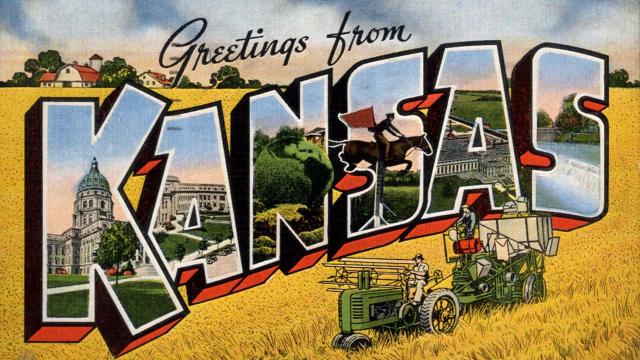
Republican lawmakers in Kansas put an end to the state’s failed tax reform experiment on Tuesday, overriding the governor’s veto after three attempts to pass a tax-hiking bill this year.
The new law raises income and business taxes closer to pre-reform levels — a move Republicans had been resisting for years. But pressure had been mounting to do something. The drastic tax cuts enacted five years ago left the state in a fiscal mess, unable to balance its budget and properly fund its public schools.
Gov. Sam Brownback’s signature tax reform closely mirrors the tax plan that President Donald Trump is trying to get through Congress. In fact, they were designed by the same supply-side economists.
While the new Kansas law doesn’t roll back all the elements of the tax plan, it eliminates most of them, including the most controversial one: the zero tax rate for owner-operated businesses. The change was intended to spur business investment and expansion, but instead, it created massive tax avoidance, according to researchers.
The fate of Kansas’s tax experiment provides many clues about what could happen if Congress goes along with Trump’s vision for tax reform.
Economic Growth Predictions were Wrong
In 2012, Brownback pushed through aggressive tax cuts very similar to what Trump wants Congress to do. The state increased the standard deduction and lowered taxes on corporations, individuals, and owner-operated businesses. Like Trump, Brownback insisted that the cuts would unleash so much economic growth that the government would make up the lost revenue. The cuts were supposed to give the economy “a shot of adrenaline,” as Brownback put it at the time.
Instead, the Kansas economy tanked. For two years in a row, the state’s credit rating has been downgraded because of its budget problems. Job creation and economic growth is far below the national average. The state is facing a budget shortfall of about $889 million in the next two years.
How did this happen? According to economists, one major factor was that Brownback’s plan eliminated taxes on owner-operated businesses, known as pass-throughs. Brownback promised this would kick-start economic growth by encouraging business owners to reinvest the extra money and expand their businesses.
Instead — according to new research from economists at the University of South Carolina, Indiana University, and the US Treasury Department — it led to serious tax avoidance.
The researchers analyzed federal tax returns for more than 1 million taxpayers in Kansas and four bordering states — Missouri, Oklahoma, Colorado, and Nebraska — in the two years before the tax reform went into effect in 2013, and two years after.
If Brownback’s theory had been right, the tax returns would have shown that business in Kansas was booming.
“The initial expectation was that lowering the tax rate would increase business activity,” says Jason DeBacker, an economics professor at the University of South Carolina and the lead author of the study. “You might see people earning more income or businesses expanding in employment or investment. But there was little or nothing of that going on.”
The analysis showed that while reported business income did go up, it was mostly from people who previously earned wages from an employer (in a W-2 tax form), and later reported earnings from the same employer as contract business income (in a 1099 tax form).
In other words, people were gaming a particular aspect of the new system. Owner-operated businesses are treated differently by the tax code than other businesses. Instead of the business paying corporate taxes on the profits, the owners pay individual income taxes on them. (Income you make as profit from a business you own is known as “pass-through income.”)
But Brownback got rid of the tax on pass-through income. So there was suddenly a big incentive for people to find a way to reclassify their income as business income. If you were an engineer working for a company, you’d pay individual income taxes on the money you made. But if you were a self-employed freelance engineer — a one-person business — who contracted with the company instead, you’d pay zero income taxes.
And that’s exactly what happened. Businesses did not expand and invest more as a result of the tax savings, the report says, though it was linked to a slight increase in wages. Instead, the research suggests it just led to widespread tax avoidance. People found ways to get paid for the same jobs they were already doing but paid much less in taxes.
The consequences were big. Economists believe tax avoidance was responsible for about 1.7 percentage points of the 8 percent drop in revenue for the state the year after the reform was enacted.
Kansas is Struggling to Balance its Budget
Moderate Republican lawmakers in Kansas are now in open rebellion, scrambling to find ways to roll back the tax cuts as the state looks for ways to balance its budget.
In recent years, lawmakers raised sales taxes and cigarette taxes to help balance the budget — a move that places a larger burden on low-income families. They also slightly reduced the tax deduction people can claim for mortgage interest and property tax payments. But even those moves weren’t enough to fill the state’s budget hole.
The budget crisis has collided with a long-running battle over public school funding. The state’s public schools are shouldering the burden of the state’s budget crisis, with $44.5 million cut from public education in 2015 alone.
The state was already tied up in a legal battle over school funding before Brownback took office. In March, the state Supreme Court ruled that funding for public schools was unconstitutionally low. The Court gave the state a June 30 deadline to find a new way to finance public education to close the achievement gap between white, affluent students and students who are ethnic minorities or poor.
Lawmakers have been struggling to come up with the money, which has increased pressure to roll back some of Brownback’s tax cuts.
Brownback and Trump got Advice from the Same Economists
Trump and Brownback don’t have the exact same vision of tax reform — Trump doesn’t want to cut all taxes on pass-through businesses. The impact on the federal government would be different, though, because lawmakers in Washington, DC, aren’t required to balance the federal budget: They can borrow more money and add to the deficit. However, Republicans have signaled that they plan to pass tax reform through the budget reconciliation process, which means the tax cuts can’t add to the deficit after 10 years. This tool will allow Republicans to pass a bill with a slim majority (no Democrats needed).
Still, both plans have the same overall structure, because Trump and Brownback both got tax policy advice from the same two economists: Arthur Laffer and Stephen Moore.
Laffer was an economic adviser for President Ronald Reagan and now runs an economic research and consulting firm in Tennessee. Moore is an economist at the Heritage Foundation.
For decades, these two supply-side economists have been pushing the notion that cutting taxes unleashes incredible economic growth. Both were the architects of the Kansas tax experiment, and both helped Trump craft the tax plan he touted during his campaign (which is nearly identical to the one he released last week).
Last month, they co-authored an editorial in the New York Times, urging Republicans to stop worrying about how much money the government will lose from cutting taxes.
President Trump and Paul Ryan, the speaker of the House, should stop insisting on “revenue neutrality.” In the short term, the bill will add to the deficit. But President Trump’s tax bill, like those of Presidents Ronald Reagan and John Kennedy, should be a tax cut, and it should be sold to the American people as such.
Toward the end of their editorial, they added this: “If we are right that tax cuts will spur the economy, then the faster economic growth as a result of the bill will bring down the deficit.”
Mainstream economists do not share their idea that tax cuts will be so good for the economy that they will flood government coffers with more money. While some economic growth often happens as a result of cutting taxes, it’s not enough to make tax cuts pay for themselves, as Treasury Secretary Steve Mnuchin suggests.
Earlier this year, the editorial board at the Kansas City Star warned Trump not to repeat the same mistakes that Kansas did. It was strikingly different from the op-ed written by the economists who helped craft both plans:
“We do not oppose tax reform. Paying federal taxes is too complicated and too distorted by tax breaks for special interests. Taxes at all levels should be simple, low, broad and fair. But the president isn’t just proposing tax reform. He also wants a trickle-down tax cut for the wealthy. Kansans know how this story ends.”
3 WAYS TO SHOW YOUR SUPPORT
- Log in to post comments












